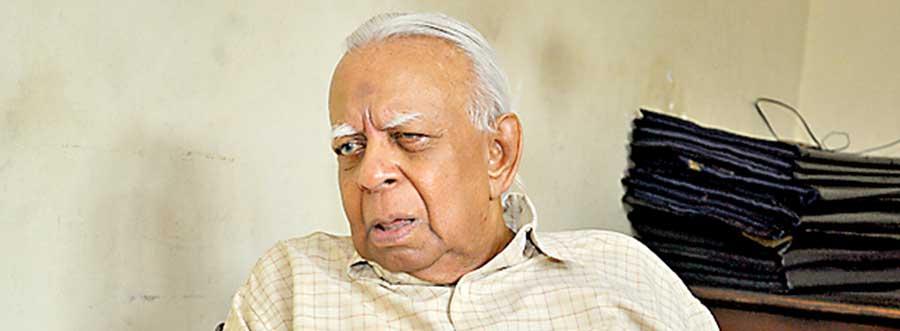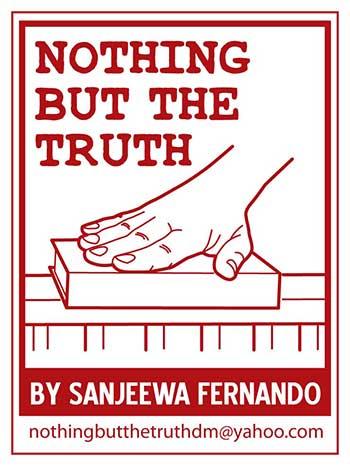Reply To:
Name - Reply Comment
Last Updated : 2024-04-25 00:00:00

TNA leader R. Sampanthan
The Election Manifesto recently issued by the TNA for the August General Election makes it unequivocally clear that the political aspirations (at least as expressed by the TNA) of the Northern Tamils are, what they have been, always: the recognition that they are distinct nationhood and a federal arrangement with the merger of the Northern and Eastern Provinces. As outrageous as it might sound, to many in the South, who erroneously equate Federalism to separatism, the demand for a federal arrangement of power has been a persistent feature of any proposal that has come from the North to solve the national issue.
The election topics in the South hardly pay any heed at this point to the issue of solving what remains as an ethnic conflict, after a civil war that raged for 30 years. For the Mahinda Rajapaksa government that won the war, it was a matter of defeating the LTTE militarily and then building infrastructure for the North, totally failing to understand the conflict that has started with the Federal Party in 1949 is one connected to the aspirations of the Tamils as a people. The Yahapalana government that took certain limited but positive measures to address the issue of reconciliation lacked the will and the political muscle to take them further.
The TNA quotes Indian Prime Minister Narendra Modi’s address to Sri Lankan parliament in March 2015 where the  Indian Premier hoped for “cooperative federalism”, and further adds that “it is through a constitutional engagement on the model of federalism, within a united Sri Lanka that the legitimate aspirations of the Sri Lankan Tamils and other Tamil-speaking inhabitants of the north and eastern parts of the island could be met”.
Indian Premier hoped for “cooperative federalism”, and further adds that “it is through a constitutional engagement on the model of federalism, within a united Sri Lanka that the legitimate aspirations of the Sri Lankan Tamils and other Tamil-speaking inhabitants of the north and eastern parts of the island could be met”.
The demand for a federal arrangement is going to draw a lot of flak from the Sinhala Buddhist dominated South with none of the Sinhala parties willing to invite the ire of the majority in a closely contested election. Although the SLPP would have been tipped to cruise to victory earlier, with the date of the General Election postponed to August 5, the support base is expected to be dwindling for many reasons. In such a context they too, are eager to pacify the majority, including the Maha Sangha. Certain incidents such as the Karuna Amman statement, a revelation by the former Minister Johnston Fernando as well as the very recent demolition of an archaeological site in Kurunegala has not gone down well with the Buddhists and the opportunity of lashing out at the TNA’s Federal Demand will be used by the SLPP.
The issue of reconciliation and accountability with regard to the last phases of the war in the North has always been a sore point in Southern Politics. Constitutional changes that were in the pipeline during the Yahapalana government had to be ditched due to the unstable and divided nature of that government. Any future constitutional arrangement in that regard is very unlikely. Quite to the contrary, the intention of the Rajapaksas to scrap the 19th and 13th amendments as well as a general aversion for extensive power-sharing, in the majority south might even bring out the risk of folding back democratic changes as well as mechanisms that have been put in place with reconciliation, accountability, and transitional justice in mind.
In such a context the demands in the TNA manifesto for those very things are likely to ensure the divide that already exists in terms of cooperative and consensual sharing of power, let alone ‘cooperative Federalism’ as envisaged by Modi, will deepen, thus distancing them further from the majority Sinhalese and further lessen the chances of converging on a compromised settlement on dialogue. But what they seem to hope, in fact, to achieve through such intemperate slogans as Federalism, though entirely legal and constitutional as determined by the Supreme Court in the case of Chandrasoma vs. Senathiraja, is a polarised uniformity in the Northern Tamil vote against the unitary structure of the State and majority dominated rule.
The much harped about Two-Thirds majority the SLPP expected was intended at rolling back the 19th as well as the 13th amendments or even an entirely new Constitution that would, firstly, make power highly centralised both in terms of the structure of the state and the concept of separation of powers; and secondly, lay the framework for a legislature based on an electoral system that would not rely on any minority party. Needless to say that such a constitutional scheme would be diametrically opposite to what the TNA wants to achieve. Such a situation will entrench the dominance of the TNA in the North and Rajapaksa dominance in the Southern political landscape. Neither Tamils nor the Sinhalese would be a step closer though, to achieving a permanent, lasting, and peaceful solution to the ethnic issue.
The TNA manifesto covers the political landscape, or at least their rendition of it, that existed after the gaining of Independence, as the justification of their demands for federalism. The disenfranchisement of Tamils of Indian origin, the Sinhala-Only Act, the vilification of Tamil parliamentary representatives from the North, the Black July, gross violations of human rights during the last phase of the civil war, Sri Lankan government’s failure to take accountability and transitional justice measures, figure large in that landscape. Not only the TNA, but some vitriolic speeches by even Tamil candidates representing major parties, aimed at the Sinhalese and the Military do seem to be attempts of buying support in their community. The same applies, the other way around, among the southern politicians in winning over the Sinhala vote.
The TNA is understandably indignant that even the 13th plus arrangement that Mr Rajapaksa repeatedly promised to India during his second term of Presidency came to nothing and despite being in power for almost five years, the Ranil – Maithri government, the Tamils overwhelmingly supported, had fallen short of delivering. The mention of Premier Modi in the manifesto could be a subtle way of heaping up the heat on the government that the ‘Big Brother’ is watching the developments in Sri Lanka. The interest India had shown in the destiny of the Tamil-speaking people in the North and the East, in particular, is not a secret and is understandable.
During the last Presidential Election, the TNA supported Sajith Premadasa, from the UNP led alliance, which is usually considered ‘devolution friendly’ as opposed to the Sinhala based policies of the Rajapaksas. The fact that the SLPP is going ahead with the Presidential Election manifesto without a new one for the General Election, indicates that the unyielding and centripetal power structure they promote will be a far cry from what the TNA expects for the Tamil people.
If the TNA wants genuine reconciliation, the Manifesto is hardly going to achieve it; yet if its allegiance from the Northern constituency based on polarising political fault lines, they might succeed. So would the Sinhala politicians in the South.

Add comment
Comments will be edited (grammar, spelling and slang) and authorized at the discretion of Daily Mirror online. The website also has the right not to publish selected comments.
Reply To:
Name - Reply Comment
US authorities are currently reviewing the manifest of every cargo aboard MV
On March 26, a couple arriving from Thailand was arrested with 88 live animal
According to villagers from Naula-Moragolla out of 105 families 80 can afford
Is the situation in Sri Lanka so grim that locals harbour hope that they coul